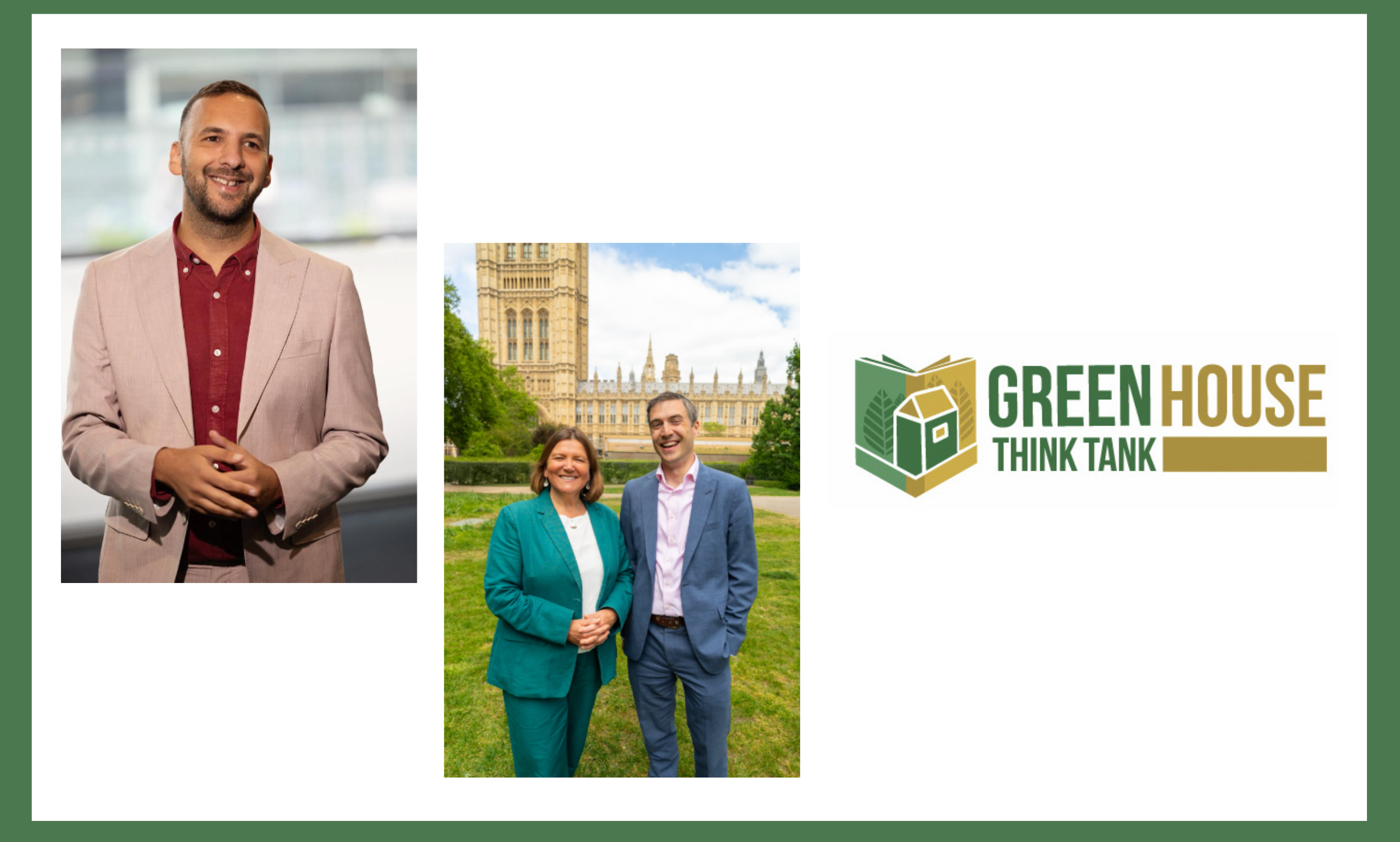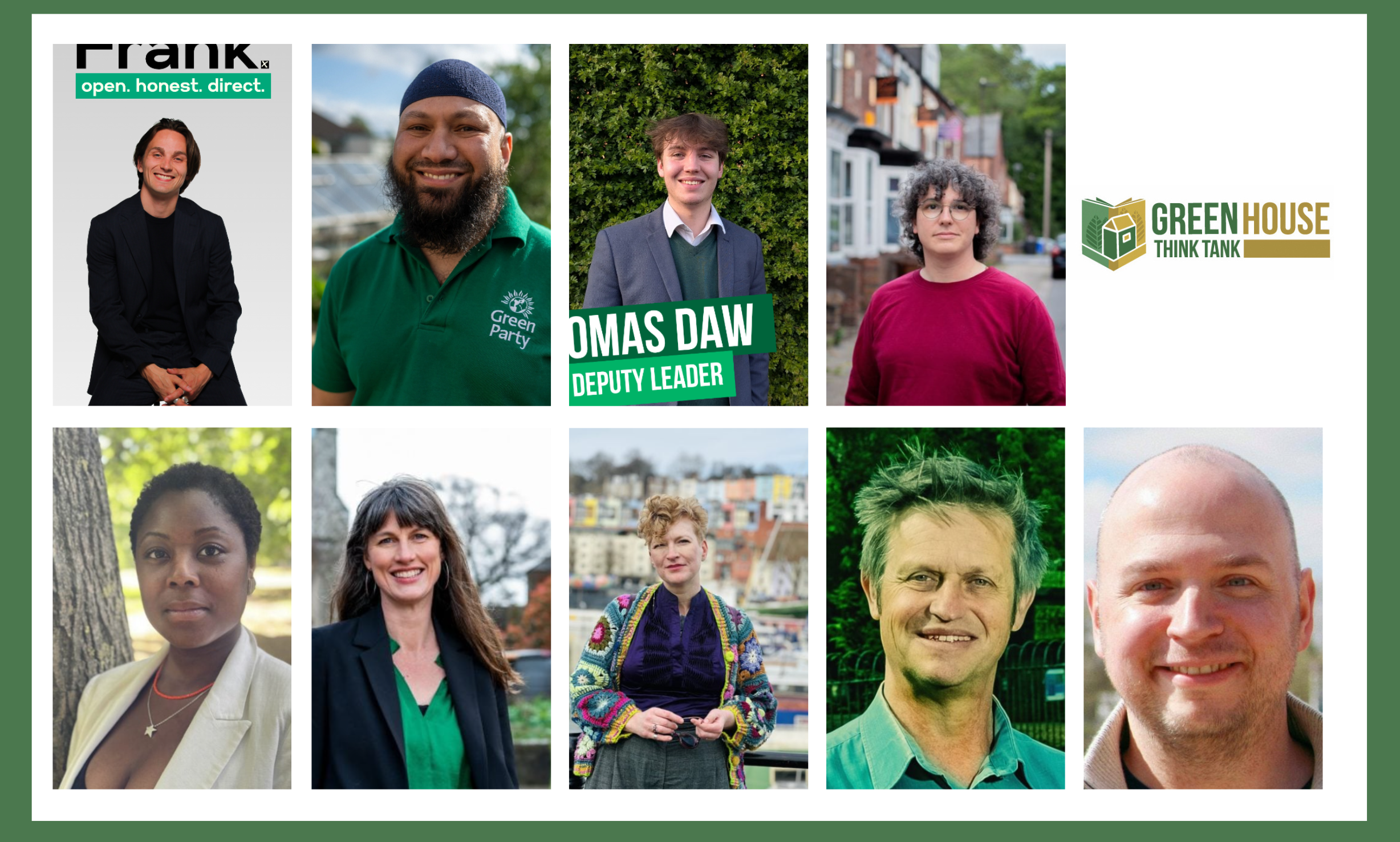
Responses from candidates for Leader of Green Party of England And Wales - Green Leadership
Responses from Leadership candidates to Questions Green House Think Tank is asking of potential Green Leaders
Following the publication of questions to leadership candidates in June, and the announcement on 2nd July of Candidates successfully nominated to be Leader or Deputy Leader of Green Party of England and Wales, Green House Think Tank gave all the candidates 1 week to submit answers.

Questions published in June 2025
Leadership Candidate Responses
1. Where are we now?
Do you think the UK is currently a democracy? Would you agree that our society’s economic and governance systems are broken beyond repair? If so, what is the Green alternative pitch? How much does economics need to change to deal with the climate emergency?
Zack Polanski
The UK doesn't have a functional democracy in any meaningful sense of the word. From the unelected second chamber to the egregious unfair voting system of first past the post to the governments shameful clampdown on non violent protest from climate action to being against a genocide.
Many aspects of the system are broken beyond repair but we must organise to replace them - specifically so that it works for people and not only for the powerful and the wealthy.
The alternative pitch looks like democracy that is based in communities where through organising and collective effort everyone has a stake in their local area and through that influences what happens in Westminster.
The alternative pitch is a party that wins lots more MPs at the next election but you don't start with the focus being on Westminster - you start with community organising and supporting and empowering people to engage with all forms of democracy including citizens assemblies and citizen science.
The inequality we're facing in our society is both making the climate crisis much worse & is driving it. Polluters from Shell to the super rich act with impunity whilst people are hungry and homeless. We need a massive redistribution of both wealth and power - and to destroy old outdated metaphors of the national economy being anything like household debt. Less made up fairy stories about the economy and more focus on real world needs and ecological boundaries.
Ellie Chowns and Adrian Ramsay
It is an essential condition for democracy that the way people vote is reflected in the allocation of power. This isn’t the case in the UK because of our absurd electoral system. We’ve both been involved for many years in campaigning for fair votes, and Ellie is the vice-chair of the Fair Elections APPG. This focuses on proportional representation and also on driving dark money out of politics and challenging disinformation.
Beyond the issue of elections, we see a failure of democratic culture, with rampant disinformation, a lack of democratic education in schools, and restrictions on protest. We both spoke out against the recent banning of Palestine Action under terrorism legislation and Ellie was part of a legal case against the previous government’s draconian efforts to ban XR protests.
We both strongly believe in the Green Party’s approach of ‘doing politics differently’ and working across party lines in the best interests of the country. We believe this, and a return to politics as service, will help restore democratic culture, as Adrian discussed with the Guardian.
We also see how the failure to contain corporate and financial power has led to inequality and climate breakdown. Reining in these powers is also essential to building a genuine democracy.
In terms of the economy, it’s clear that the focus on economic growth is driving the destruction of both the climate and our environment. Adrian has publicly criticised Labour’s obsession with growth at any cost and its creation of a false dichotomy between growth and nature. Rather we should see nature as fundamental to the success of our economy. We have also used the line that this government ‘knows the price of everything but the value of nothing’ to critique its approach.
2. How best can Green Parties help to transform our culture, politics and economy?
How should Greens deal with the gap between aspirations, expectations, and living within planetary boundaries?
Ellie Chowns and Adrian Ramsay
We’ve always said that we have to make sure that the greenest option is also the best, cheapest and most accessible option. In response to the Planning and Infrastructure Bill, Adrian has said that ‘we can have safe, warm homes in the communities we love at a price we can afford, and look after nature’.
An example might be investment in public transport so that it is people’s first choice. Ellie has experience of supporting bus services in rural areas, something she has argued for in Parliament.
The high level of material aspiration on the part of individual citizens arises partly from the breakdown of community cohesion as well as an economy that is not adequately regulated. We should invest in community - youth clubs are are a great example - which would also help to reinforce our democracy. But we should also have the courage to restrain advertising of high-energy products and to carefully regulate the energy impact of technologies such as AI (see Ellie’s WQ on this).
We change culture by winning hearts and minds. As leaders it is our job to reach out to those who are not already voting Green. This is what we’ve both successfully done in previously Conservative areas.
But, ultimately, as a political party, getting people elected is our core tool to bring change. Legislation is needed on the biggest issues to align with planetary boundaries. We are already putting pressure on the government and limiting their worst excesses but we are ambitious for Greens to have real power at Westminster. We see a potential for holding the balance of power in the next government and we aim to build the party’s strength to ensure we have enough MPs to achieve that.
Zack Polanski
Regressive forces used to focus on nostalgia and patriotism to tell their stories. Recently they've started to be more future facing - artificial intelligence and space travel.
In the Green movement we need to have our own set of stories of what a good life looks like, stories people can connect with. We were told we'd work less hours and get more pay but most peoples’ experience is exactly the opposite. It's a life with beautiful public spaces, a Universal Basic Income, a 4 day working week - where we don't obsessive over GDP (A terrible way to measure happiness and well being!) and we focus instead on physical and mental health and our collective happiness.
Our Green Party can place a huge emphasis not just on Parliament but actually on communities. What happens when people get together and create art? What are the stories that marginalised groups can tell about themselves in the places of power? I proposed and passed a motion in London's City Hall for a different group each year to have the main space to be able to create art that tells a collective story about themselves. (The Mayor stepped in and said no but that's another story!)
And as for aspirations - it's about telling the stories of cleaner air, unionised jobs with decent working conditions and fair pay and or cheaper bills. We must live within our ecological boundaries and we must reject the idea that doing so will be a degradation to our living standards. Quite the opposite - life at the moment is deeply unfair, unaffordable and grinding for people. We can be more hopeful and work towards social justice and environmental justice at the same time - they're inextricably linked.
3. Role of Green leadership?
How do you see your role as a leader within a democratic party? On what issues should Green Parties be a broad coalition that embraces diverse opinions, and on what issues do you feel a unified position is needed?
Zack Polanski
The role of leader in a democratic party is to be the spokesperson of the party. To help guide with the platform the motions and debates that come to conference but to ultimately be the voice of the membership. That's why it's so important our representation right now is outside of parliament - we need someone who can speak up for the membership and speak to the country at large rather than just their constituents.
And at the same time, the leader’s job is to give an opinion. Not to equivocate or to allow there to be an absence of leadership in our communications - but to work with the membership so that we're always amplifying our values and our work with clarity and compassion. Too many opportunities to lead and cut through have passed us by in the last year, often allowing Farage to drive the agenda instead.
On leadership more broadly, I think leaders don't need to be front and centre all the time. Effective leadership is being within the crowd - helping to guide it where it wants to go and bring a proud and effective member. I'm very interested in our informal leaders - those people who don't necessarily have titles or even defined roles but are doing lots within the party to help guide us towards more effective success and ultimately to effect change for our planet. New leaders aren't just found - they're developed. I think I regularly do this by believing in people and actively encouraging them and helping them connect with others in the party. Trusting that if you give people space, support and a platform then they can do brilliant things.
We should be a broad church and recognise that even churches have walls. We're an intersectional party that is rooted in social, environmental, racial and economic justice. We’re anti racist and all forms of hate crime. We stand with the marginalised and speak truth to power. Consistently. Repeatedly. And boldly. That's who we are. And we must remain a grassroots party that creates our policies through our members led process.
Ellie Chowns and Adrian Ramsay
In the Green Party, we have a distinctive take on leadership: our constitution says that the role of our leaders is about putting our policies forward in public. We believe this is best done by leaders who have the authority of parliament.
Conference decides on policy, our leaders are there to make the case for our policies in public and gain public support, not to control the party or decide our policy.
But we would also have a vote on the Green Party Executive and we’re determined to use that to rebuild party unity, raise funds so that we can invest better in our comms function in particular, as well as using our experience of winning elections to take the next step to build the party up to playing a role in government.
We believe that we are part of a team of leaders and spokespeople, but also executives on GPEX and that is a great strength of co leadership. To return to your first question, we see that single voice of leadership focussed on a populist message as a risk to democracy.
In spite of our tolerant approach, the Green Party has always had an impressive unity of vision and purpose, based on our shared values. We believe that our tolerance of opposing views is something that should be cherished and and that there is strength in diversity of thought.
4. Electoral strategy?
How should Green Parties balance gaining more nationally elected representatives as soon as possible with building a movement and consensus to transform our culture, economy and politics across the party and wider society?
Does it pay to be provocative with messaging or does this risk recent electoral success? On which issues are you prepared to be provocative?
Ellie Chowns and Adrian Ramsay
The Green Party has always followed a two-pronged strategy of combining campaigning and non-violent direct action with seeking and using political power. We believe that strategy has served us well and is the foundation of our recent unprecedented success. We have both been active campaigners and bring that experience and credibility to our work in Parliament.
We urgently need to change our politics, our society and our economy to respond to the nature and climate emergencies. To achieve this monumental change we need to work together - as MPs, with campaign groups, charities, and academics.
Between us, we’ve spent decades working for a fairer, greener world — combining grassroots activism with real-world leadership.
- Ellie’s journey has taken her from supporting peacebuilders in Uganda to tackling fuel poverty in London. She’s worked in social justice and international development, defended the right to protest, and served as a Green councillor running a Council and as an MEP before winning her seat as an MP with one of the biggest ever swings at a general election
- Adrian joined the Greens at 16, became one of the UK’s youngest councillors, and grew Norwich’s Green group into one of the biggest in the country. He’s led national environmental charities through change and growth, always focused on turning values into impact.
We’ve led in our communities and in the corridors of power, aiming to bring power back into our communities for them to thrive. As MPs, we use our platform in Parliament every day to challenge injustice and champion change. We’re insurgents with integrity, campaigners with a Parliamentary platform and the national voice that comes with it. With the day-to-day experience of using the media powerfully to share our Green message.
In terms of provocation, we need to be aware of the increasing polarisation and use of jeopardy in political messaging, that can lead people away from making rational decisions. We should resist the urge to follow the political and communication strategies of the far right and be prepared to organise a firewall to keep out fascism at the next election.
Zack Polanski
We should never be provocative just to get attention. What we should always do is speak the truth - and if that happens to provoke people, then make sure our arguments are well researched, our rebuttals well understood and that we have our best communicators making the case.
Far too often we get lost in the policy detail or in the ingredients and the recipe rather than communicating the final product. The meal and how it will change people's lives.
I don't see a binary between movement building and winning more MPs. In fact I think they both work in tandem. Being part of campaign groups, faith groups and non faith groups embedded in communities and organising around them creating the links is a brilliant route to winning lots more MPs in the future.
We should never shy away from communicating our values. Even if people disagree with us, lots of research demonstrates that people respect the authenticity and the conviction of telling the truth. Of course there are ways to deliver that are better than others and suited to the appropriate audience - but we (and the country) badly and urgently need a bolder Green party.
5. Is there anything that you would like to add?
This is an opportunity to add any points that the preceding questions have not covered and that you consider to be important for Green House readers and Green Party members to hear.
Zack Polanski
This is such a huge moment for our country and our party. We have a climate and nature crisis. Yet we have a government expanding airports and building new roads. This is the exact moment we should be nationalising our energy companies and our water companies - but instead the latter are pumping sewage into our water and expecting us to pay extra for the privilege.
On nature we have a government who claim repeatedly - despite heaps of objective evidence that it's just not true - that nature and planning is the block to tackling the housing crisis. There's such an obvious argument to be made about tackling the climate and nature emergency and making our communities better. Making sure all new homes have renewables, passivhaus standards with a brownfield first approach.
We have most of the policies already. What has been lacking is the boldness to communicate them consistently, clearly and inspiringly.
Voting for me in this election is a chance to make sure that not just people who already support the Greens vote for us - but many more people. We need to speak to the entire country and connect with them in their language and make sure that when we're telling stories, they feel themselves as part of the protagonists.
That cannot happen by basing future campaigns on a Parliamentary building that people have lost trust in. It happens by making people know that in their communities they can make the difference. And voting Green will elect more MPs who will fight for them on wealth taxes, climate action and for the survival of all of us. The stakes are really that high and the need for change in this moment is that urgent.
Ellie Chowns and Adrian Ramsay
We would like to thank you for your work in doing important thinking for the party and the movement, something that frontline politicians often lack the time to do. This adds strength and depth to our work. Please take a look at our website and join our campaign. www.ellie-adrian-2025.org

Follow up interviews

Deputy Leader Responses

Find out more about why Green House is asking these questions...
Find out more about Candiates:




